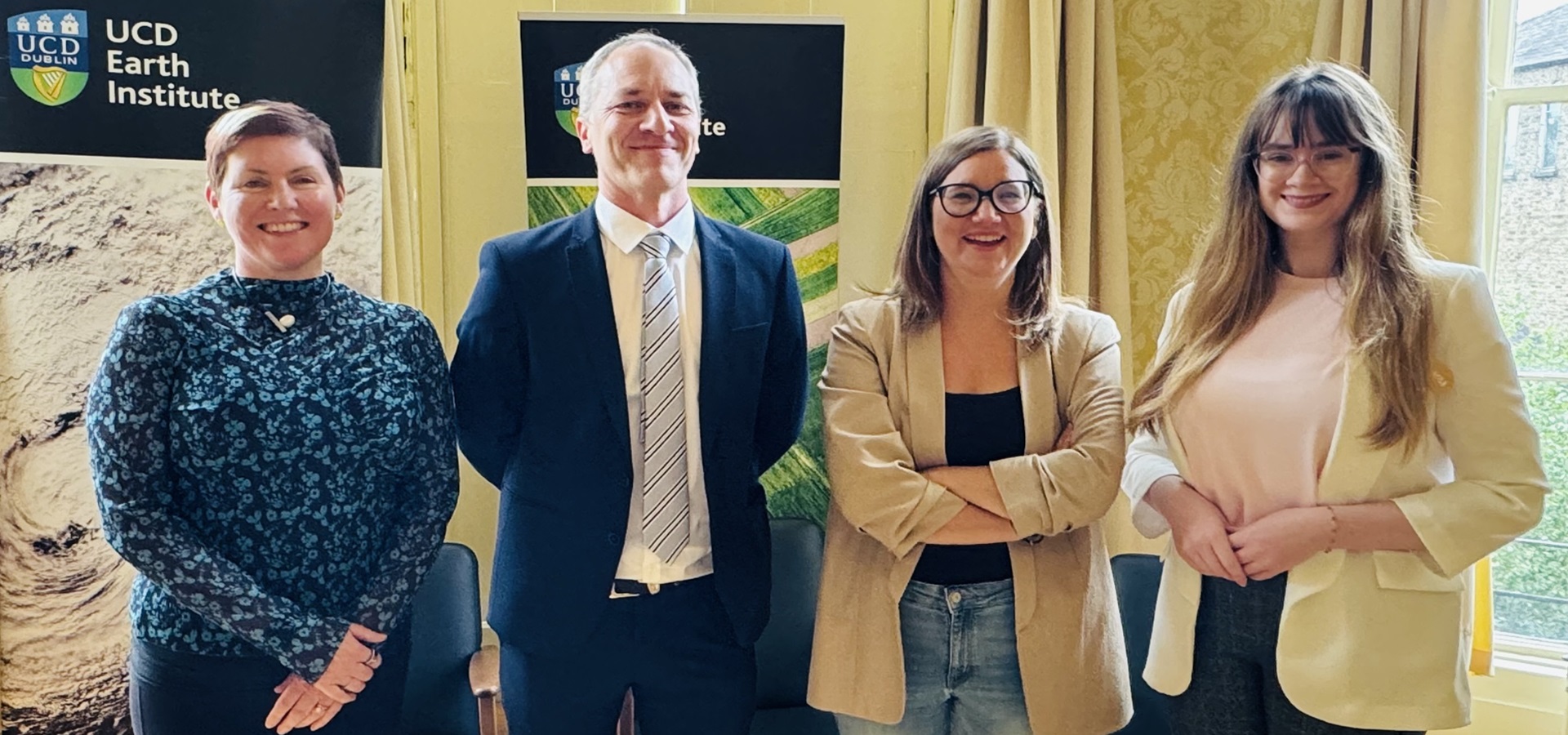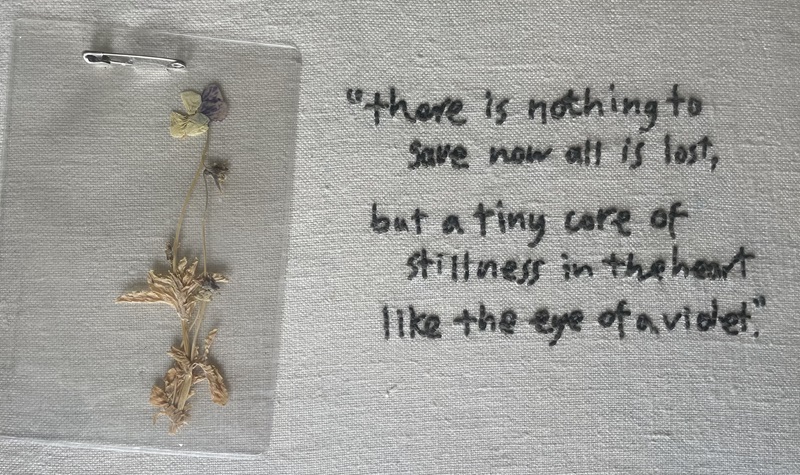Launch of Strategic Priority Support Mechanism 2023
Launch of Strategic Priority Support Mechanism 2023
This week, we are launching our sixth annual call for proposals to identify short-term strategic priorities for the Earth Institute. The Strategic Priority Support Mechanism 2023 will continue to stimulate interdisciplinary environmental research activity across the Institute, the University and beyond, with funding of up to €10,000 awarded to each of 2-4 multidisciplinary teams per annum. The scheme aims to fund the development of interdisciplinary research capacity as well as more external-facing activities such as policy, societal and public engagement.
Full details of the call, including eligibility, evaluation and the application process can be found here. The application deadline is 5pm on Wednesday 14 June. If you have any questions please contact Earth Institute Director Tasman Crowe or our Research Manager, Caitriona Devery. We are very happy to discuss ideas in early stages of development and may be able to help you find co-applicants. Applicants should propose a project on a topic which could be considered strategically important, within one or more of the Institute’s cross-cutting dimensions and research themes.
Last year, four strategic priority projects were supported through the scheme: TREAH: Transport Research Hub @ UCD, led by Paraic Caroll (Civil Engineering), Data Farms and Urban Farms: Alternative Energy Flows Within Data Storage Infrastructure, led by Mary Harty (Agriculture and Food Science) and Clare Lyster (Architecture, Planning & Environmental Policy / UIC school of Architecture in Chicago), Just Transition Research Group (JTRG), led by Aparajita Banerjee (Business) and Geertje Schuitema (Business), and Cultural Landscapes and Social Spaces (ClaSS), led by Brendan O’Neill (Archaeology). This brings to fourteen the total number of projects funded so far.
Applications to the scheme are an opportunity to bring together an interdisciplinary team to address a topic of mutual interest and may involve external organisations. The scheme aims to fund activities that will establish or enhance applicants' profile in an emerging area or substantially progress an agenda, and will be fully supported by the institute.
The scheme often covers the cost of events, travel and website development but recently projects have been using the budget to fund a short-term appointment to support the project delivery, which can be a very constructive use of funds. The scope of what can be funded is very open - a non-exhaustive list of eligible costs are included in the call document and we can provide clarification if needed..
Some of our recent and previous awardees' experiences and insights can be found below:
“The Earth Institute’s Strategic Priority Support Mechanism (SPSM) fund has been a great support allowing the Cultural Landscapes and Social Spaces (CLaSS) project to engaged partners and grow capacity. Through this we are aiming to link national and international academics to the potential for studying organic, light-framed houses, while introducing them to a European network of Archaeological Open-Air Museums (AOAM), with extensive experience recreating these structures. The openness and advice from the Earth Institute team during the pre-application stage was a great help. Once awarded, the supports were invaluable and included access to their team’s experience and networks, development of a webpage, communications and marketing, and assistance with project administration. All of this allows projects to focus on growing and developing excellence.”
- Dr Brendan O’Neill, Cultural Landscapes and Social Spaces project (2022)
“The SPSM 2022-2023 funds helped us create the Just Transition Research Group at UCD. This group aims to bring together researchers interested in the Just Transition concept and co-produce knowledge exploring how justice and equity principles can shape public policies for a sustainable low carbon future. Additionally, the continued support and resources provided by the UCD Earth Institute to our project are helping us achieve more than the scope of our project”
- Dr Aparajita Banerjee and Dr Geertje Schuitema, Just Transition Research Group (2022)
“We were awarded funding last year. Initially we were unsure if we should apply since our project was a little different than those funded in previous years. However, the Earth Institute offered great encouragement and advice on how we could articulate our ideas into a clear and provocative proposal. Furthermore, since then, the Earth Institute has been super enthusiastic as we move forward to materialise our project, whether it’s organising an event, making connections to expand our team, or designing a website. Overall, the process has been very productive and a lot of fun! Everyone at the Institute wants to make the research have a real impact”
- Dr Mary Harty & Dr Clare Lyster, Data Farms and Urban Farms: Alternative Energy Flows Within Data Storage Infrastructure (2022)
"We all found the process smooth, with very helpful support. The application isn't too long - but long enough that you do have to think about things."
- Prof Graeme Warren, Mountain Research Group (2021)
"The Earth Institute’s Strategic Priority Support Mechanism (SPSM) call has been instrumental in facilitating practical work between academics, researchers and the community in the SDG Dashboard Project. Partnership is central for action research into sustainable development, but without funding support it is difficult to take forward the implementation of local actions, or the organising of community co-creation and capacity building events. The Earth Institute’s SPSM goes beyond financial support in enabling the implementation of such initiatives and associated activities. The team behind the SPSM has helped us coordinate efforts and disseminate the project and its findings, as well as facilitated networking connections and provided assistance as and when needed. I think the open focus is great and as a 'seed' funding it really works."
- Dr Ainhoa Gonzalez Del Campo, Community SDG Dashboard (2020)
"Interactions within Re-EcoNet have supported the key idea for an application to the SFI Frontier for the Future Programme. This 4-year project has been funded and is now supporting a post-doctoral researcher and a PhD fellow plus the costs of research on the response of plant-soil microbe network to extreme perturbations. Interactions within Re-EcoNet have also led to the draft of Literature Review paper on network methods with Tancredi Caruso, Matthias C Rillig and Diego Garlschelli as authors, currently under review. We launched our website at the end of 2021 which will be key to our dissemination strategy. Re-EcoNet also hosted a number of workshops and seminars in 2022."
- Dr Tancredi Caruso, Re-EcoNet (2020)
"Over a 2-year period, the UCD Centre for Irish Towns (CfIT) will have evolved from an idea to an approved centre for research and training in UCD, all facilitated by the SPSM. The financial award has allowed us to develop communications tools and run events (pre-COVID!), and the direct supports from the Earth Institute, for example in terms of contacts, advice and human resources, have been invaluable. The SPSM scheme is really a leg-up, with the Earth Institute crew cheering you on. It has built momentum and given us confidence to progress and develop our idea".
- Dr Philip Crowe and Dr Orla Murphy, Centre for Irish Towns (2019)
"DIVERSICROP’s primary aim was to develop a COST Action application that would investigate selected underutilized crops well-suited to European climates and environments and extensively cultivated in Europe’s past. That application was submitted in 2021 .The original idea stemmed from conversations between the two Co-PIs at UCD and Earth Institute research events, where they learned that both were investigating crops but from very different perspectives – one focusing on modern crop science and the other on crops grown thousands of years ago. They developed a collaborative project – DIVESRICROP – which also brought in UCD researchers in nutrition and policy to enable a more comprehensive approach towards diversifying crop production and sustainably producing nutritious food. The SPSM initially enabled a framework to develop the project and attract collaborators. It has since facilitated the appointment of a project administrator (which has been crucial in a project with a large and diverse team and a complex research challenge), and we have benefited greatly from the wealth of experience in the Earth Institute on project and network development. We found the scheme excellent as we had the freedom to design the project and budget according to our needs. The process was very straightforward."
- Dr Sónia Negrão and Dr Meriel McClatchie, DIVERSICROP (2019)

